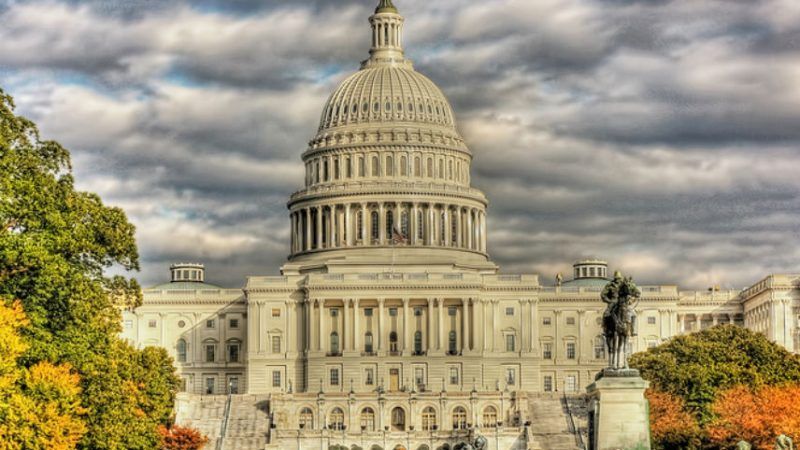The Federal Government Never Lets a Serious Crisis Go to Waste
Federal power grows through sudden, quantum leaps in times of emergency.

In Crisis and Leviathan, his masterpiece on the metastasis of the modern state, scholar Robert Higgs shows how the federal government historically has followed the Rahm Emanuel rule: Never let a serious crisis go to waste.
The expansion of federal power has not been steady and inexorable; it has grown through sudden, quantum leaps in times of emergency, most especially war. The crises eventually subside, but many of the powers remain—to be built upon later when the next crisis unfolds.
Lately this phenomenon has proven itself fractal: The pattern repeats itself on small scales as well as large ones.
We can see that here in Virginia, where a commission appointed by Gov. Terry McAuliffe (D) has been drafting new rules for demonstrations around the Lee monument in Richmond. In the aftermath of the race riots in Charlottesville, the governor imposed a moratorium on all demonstrations at the monument, which is owned by the state. This is unconstitutional prior restraint of speech, and an abdication of government's fundamental responsibility: to protect people who are exercising their rights against the threat of violence.
An out-of-state group of neo-Confederates eventually decided to hold a rally near the monument anyway. Wisely, the governor's office did not try to shut it down.
Now, though, the commission is considering several regulations that would muzzle free expression at the monument. It has proposed requiring permits for any event involving more than nine people. It would limit events to two hours. Participants would have to file their permit requests 45 days in advance—or, in what passes for a concession to exigency, six days in the cases of more "spontaneous" events. (Governor to citizens: Spontaneous demonstrations allowed only when carefully planned.)
These rules would remain in effect for 18 months—i.e., for almost two years after the crisis in Charlottesville had ended. And by then, the General Assembly might have made the restrictions, or others like them, permanent.
You also can see the phenomenon of crisis-and-reaction at work in the response to the discovery of Russian-made advertisements and fake accounts on Facebook.
Democrats, including Virginia's own Sen. Mark Warner, are suddenly keen to pass new laws and rules to more tightly govern how social-media companies operate. Russian incursions into social media, they contend, are a crisis that must be answered by expanding government's reach.
Pause here for a moment to enjoy the irony: When Mitt Romney declared Russia America's biggest geopolitical foe during the 2012 presidential contest, Barack Obama mocked him—"the 1980s are now calling to ask for their foreign policy back"—and The New York Times excoriated him for displaying either "a shocking lack of knowledge about international affairs or just craven politics. Either way," the paper said, his comments "are reckless and unworthy of a major presidential contender."
That, however, was before Russian cyber-trolling could be used to justify more government regulation. It's worth noting that under federal law, political electioneering advertising by foreign countries is already illegal, and political issue advertising must disclose that it's being supported by the foreign agent, whether governmental or nongovernmental, behind it.
So the need for new legislation is, at least, open to question—especially given the possibility that such legislation could open a back door for regulating political speech online by ordinary American citizens.
The phenomenon Higgs describes is emphatically not a partisan problem. For proof of that, just look at the Trump administration's travel ban. The original ban ostensibly aimed to prevent terrorist attacks like 9/11. Yet it exempted Saudi Arabia, which was home to many of the 9/11 attackers, while singling out travelers from other nations whose residents had killed a grand total of zero Americans in terrorist attacks.
Courts blocked the original version of the ban, and terrorist attacks by foreign nationals did not suddenly erupt. Nevertheless, the latest version of the ban adds North Korea, Chad, and Venezuela and extends the hold on visas from the original 90-day period into the indefinite future. A great comfort to concert-goers in Las Vegas, no doubt.
The attacks of 9/11 ushered in two wars and a vast new surveillance state, but smaller crises—much smaller—have had a leviathan effect as well.
Travelers in the U.S. are forced to remove their shoes at the airport, which—given airport volumes—happens several hundred million times a year. They do so because Richard Reid tried to set off explosives in the shoes he was wearing on an American Airlines flight. In December of 2001. He failed.
Still, thank heaven for small favors: At least Umar Farouk Abdulmatallab did not precipitate a similar policy eight years ago, when he tried to ignite the explosives in his underwear.
This column originally appeared in the Richmond Times-Dispatch.
